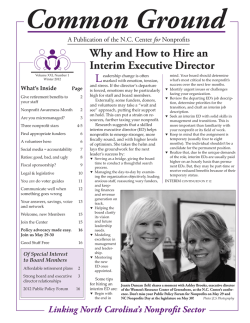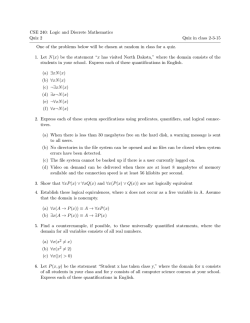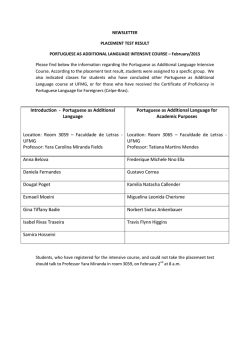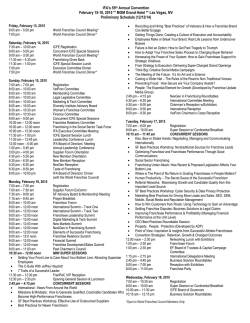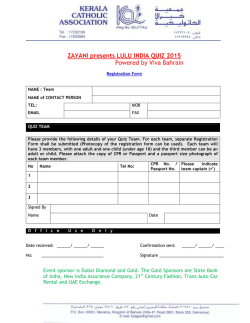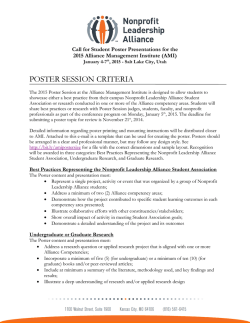
PMAP 3231 Nonprofit Leadership and management
Nonprofit Management and Leadership PMAP 3231 Spring 2015 Professor: Dr. Nicholas Harvey Contact Phone: 404-413-0121 Email: [email protected] (Contact through Brightspace) Office Location: AYSPS, Room 357 Office Hours: By appointment Class Meetings: Mondays, 7:15-9:45 pm Class Location: Aderhold Learning Center, Room 202 Course Description: This course will examine the theoretical and practical issues associated with leading and managing nonprofit organizations. Theories and analytic frameworks about leadership and management will be examined along with the appropriate roles and responsibilities of leaders and managers of nonprofit charitable organizations. In addition, other topics to be covered include, but are not limited to, board governance, nonprofit enterprise, accountability and program evaluation, collaborations and mergers, and advocacy. The role of leaders and managers will be integrated into discussion topics throughout the course. Course Objectives: To provide a working knowledge of the current theoretical and practical issues of nonprofit leadership and management. To build awareness of the leadership and management challenges found in the nonprofit sector. To develop critical thinking about different approaches to nonprofit leadership/management. To provide a working knowledge of how to manage specific areas of nonprofit leadership and operations including boards, staff, fiscal accountability, strategic planning, collaborations, and advocacy. To provide practical experience through case study analysis about nonprofit leadership and management issues. Course Requirements Each student must complete the assigned readings as scheduled and on time. Each student must actively participate in class discussions. Each student must complete all assignments and submit them on time. Each student must be respectful of other students’ ideas and experiences. 1 Required Texts Worth, Michael J. (2014). Nonprofit Management: Principles and Practice. Third Edition. Thousand Oaks, CA: Sage Publications. Other readings on Brightspace where indicated in the syllabus. Grade Weights Class Preparation, Quality Participation, and Engagement Online Quizzes (Brightspace) Online Exams (Brightspace) Final Requirement Group Project Paper Presentation 15% 15% 30% 25% 15% 100% Grade Calculations The final grade will be calculated as follows: Grade A+ A AB+ B BC+ C CD F Overall score 97.00-100.00 93.00-96.99 90.00-92.99 87.00-89.99 83.00-86.99 80.00-82.99 77.00-79.99 73.00-76.99 70.00-72.99 60.00-69.99 < 60.00 Expectations This course relies on quality student participation to function properly. I will call on students by name to address discussion topics, so I expect that you will have completed the required readings for each class. I strongly recommend that you supplement the required readings with others drawn from the suggested resources list and other nonprofit literature sources. Students will have the opportunity to lead class discussions during the semester as a part of the class preparation and quality participation grade. Brightspace is the learning platform for the course assignments and communications. Please check course content and email frequently for assignments, readings, and requirements. The instructor will communicate with you through Brightspace and will expect your electronic communication through Brightspace as well. Please be aware of the Brightspace maintenance schedule (provided online) when Brightspace will be unavailable. 2 Policy on Class Attendance, Absences, and Late Assignments GSU Policy on Class Attendance Students are expected to attend class and abide by the instructor’s attendance/absence policy (stated in the course syllabus). This pertains to face-to-face classes as well as on-line/hybrid classes. Students may receive excused absences for the following as listed in the Student Code of Conduct Manual (p.38): http://codeofconduct.gsu.edu/files/2013/03/2013_2014OnCampusHandbookStudentCodeofConduct_LastAmended_May_1_20138_13.pdf The quality of this class is contingent on the diversity of ideas and perspectives shared in class so please try to minimize absences. If you plan to miss a class, please notify the instructor at least 2 days in advance. Unexcused absences will negatively impact your grade. No late assignments will be accepted. The assignment is due when it is scheduled to be submitted. There will be no make-up exams or assignments. A death in the immediate family and your hospitalization are the only two reasons that come to mind for missing an assignment or exam. In either of these cases, I should be notified as soon as possible and no later than the start of the test or deadline. In only rare circumstances will I award a grade of Incomplete. As with the exams and assignments, a death in the immediate family and your hospitalization are the only two reasons that would persuade me to give you an Incomplete. Reasonable Accommodations Students with disabilities that could affect their ability to participate or perform well in the course should see me early in the semester. I am receptive to these situations and will make reasonable accommodations. Students who wish to request accommodation for a disability may do so by registering with the Office of Disability Services (ODS). Students may only be accommodated upon issuance by ODS of a signed Accommodation Plan and are responsible for providing a copy of that plan to me. Plagiarism and Academic Honesty Established rules covering plagiarism and academic honesty must be followed at all times. It is the student's responsibility to know the meaning of plagiarism and when it occurs. “As members of the academic community, students are expected to recognize and uphold standards of intellectual and academic integrity. The university assumes as a basic and minimum standard of conduct in academic matters that students be honest and that they submit for credit only the products of their own efforts. Both the ideals of scholarship and the need for fairness require that all dishonest work be rejected as a basis for academic credit. They also require that students refrain from any and all forms of dishonorable or unethical conduct related to their academic work.” 3 The university's policy on academic honesty is published in the Faculty Affairs Handbook and On Campus: The Undergraduate Co-Curricular Affairs Handbook and is available to all members of the university community. The policy represents a core value of the university and all members of the university community are responsible for abiding by its tenets. Lack of knowledge of this policy is not an acceptable defense to any charge of academic dishonesty. All members of the academic community -- students, faculty, and staff -- are expected to report violations of these standards of academic conduct to the appropriate authorities. The procedures for such reporting are on file in the offices of the deans of each college, the office of the dean of students, and the office of the provost.” (Faculty Affairs Handbook section 409 http://www2.gsu.edu/~wwwfhb/sec409.html and GSU Undergraduate Catalogue section 1380 http://www2.gsu.edu/~catalogs/20102011/undergraduate/1300/1380_academic_honesty.htm) University, School, and Department policies require that I inform you that plagiarism and other forms of academic dishonesty will result in a grade of “F” on the assignment and likely in the course as well. You should be aware that academic dishonesty may also result in your dismissal from the University. The policy will be strictly enforced, particularly as it relates to plagiarism and related concerns. I take academic honesty very seriously, so any cases of dishonesty will result in an automatic F grade and will be reported to the university. Policy on Laptops and Cellular phones Students are not allowed to use cell phones during class. Any student using a cell phone during class will be asked to leave the room. Laptops may be used for taking notes and researching relevant PMAP 3231 topics. All other laptop use during class is not permitted. Voluntary Withdrawal After the last day to add/drop a course, students may "withdraw" from a course when they decide to stop attending. Withdrawing from a course prior to the midpoint of the term makes the student eligible for a grade of W if the withdrawal limit has not been exceeded. This grade is reflected on the student's official record. After midpoint the student will receive the grade the instructor assigns. The last day to withdraw with a W or WF is March 3. Course Evaluation Your constructive assessment of this course plays an indispensable role in shaping education at Georgia State University. Upon completing the course, please take the time to fill out the online course evaluation. 4 Proposed Course Schedule and Assignments This schedule will serve as a guide but not a rigid constraint throughout the semester. Any changes in the syllabus or course schedule will be announced in advance by the instructor. Week 1 12-Jan Defining and Describing the Nonprofit Sector Introductions, Expectations, and Requirements Week 2 19-Jan MLK, Jr. Holiday No Class Plagiarism Quiz http://www.lib.usm.edu/legacy/plag/plagiarismtutorial.php Pre-test and Post-test results due by noon in Brightspace Dropbox Student Essay due by noon in Brightspace Dropbox Week 3 26-Jan Nonprofit Organizations Worth Chs. 1 & 2 Journal Readings Quiz 1 due by noon in Brightspace Week 4 2-Feb Executive Leadership Worth Ch. 5 Journal Readings Quiz 2 due by noon in Brightspace Week 5 9-Feb Nonprofit Governing Boards Worth Ch. 4 Journal Readings Quiz 3 due by noon in Brightspace Week 6 16-Feb Managing Human Resources Worth Ch. 9 Journal Readings Quiz 4 due by noon in Brightspace 22- Feb Exam I Online (Brightspace) Week 7 23-Feb Strategic Leadership Worth Ch. 7 Week 8 2-Mar Measuring Performance Worth Ch. 6 Journal Readings Quiz 5 due by noon in Brightspace 5 3-Mar 8- Mar Last Day for Voluntary Withdrawal Semester Midpoint Exam II Online (Brightspace) Week 9 9-Mar Final Project Group Work No Class Week 10 16-Mar Spring Break No Class Week 11 23-Mar Capacity and Collaboration / Government Support Worth Chs. 8 & 13 Quiz 6 due by noon in Brightspace Week 12 30-Mar Earned Income Strategy / Social Entrepreneurship Worth Chs. 12 & 17 Quiz 7 due by noon in Brightspace Week 13 6-Apr Philanthropic Fundraising and Financial Management Worth Chs. 11 & 14 Quiz 8 due by noon in Brightspace Week 14 13-Apr Managing International NGO’s Worth Ch. 16 Journal Readings Quiz 9 due by noon in Brightspace Week 15 20-Apr Advocacy and Lobbying Worth Ch. 15 Journal Readings Quiz 10 due by noon in Brightspace Final Paper due by noon in Brightspace Dropbox and hard copy at 7:15p in class Week 16 27-Apr Final Presentations PowerPoint must be submitted in the Brightspace Dropbox by noon 4-May Final Requirement Period 6 Assignment Descriptions Student Lead Discussions Beginning January 26 students will have the opportunity to lead class discussions regarding the assigned topic of the day as subject matter experts. Students will be assigned by the instructor and the assignment list will be posted on Brightspace. Discussants (student leaders) will be evaluated on their ability to demonstrate topic knowledge and insight as a part of the student’s Class Preparation, Quality Participation, and Engagement grade. Online Quizzes Each student will take a weekly quiz over the assigned readings through Brightspace. The quizzes are strictly timed. However, multiple attempts (3) are allowed to maximize the grade. Online Exams There will be two online exams through Brightspace. Exam I will take place on Sunday, February 22 and Exam II on Sunday, March 2. Students will take the exam at their convenience on each assigned day. Exams are strictly timed and no late submissions will be accepted. Final Group Project Paper The final group project consists of a limited case study regarding a nonprofit management and leadership topic of your choosing including the perspective of a nonprofit executive leader whom you will interview. Topics and organizational leaders must be approved by the instructor in advance. The project rubric will be made available on Brightspace. There is a 20 double-spaced page limit on this project (not including exhibits and references). Each student in the group will be graded individually, however, there will be a shared score based on the submitted paper, which will be evaluated on the clarity of the ideas, the quality of the writing. The scores will then be adjusted for team members based on their contribution to the group and to the written assignment taking into account team member assessment. This paper must be submitted in the Brightspace Dropbox by noon and a hard copy at the beginning of class on April 20 at 7:15p. No late submissions will be accepted for credit. Final Group Project Presentation Each group is responsible for preparing a PowerPoint slideshow to share their proposal with the class. Each student in the group will be evaluated on their clarity of communication, their level of professionalism and the quality of the slideshow. The final presentation PowerPoint must be submitted in the Brightspace Dropbox by noon on April 27. 7 Each student will be evaluated by her/his group as to quality participation in the final presentation and project. Peer evaluations influence final group project grades. Textbook Links: http://www.sagepub.com/worth3e/study/default.htm http://www.sagepub.com/worth3e/study/chapter.htm http://www.sagepub.com/worth3e/study/articles.htm Selected Nonprofit Resources (including but not limited to): Chronicle of Philanthropy Foundation Review Nonprofit and Voluntary Sector Quarterly Nonprofit Management & Leadership Nonprofit Policy Forum Nonprofit Quarterly The Nonprofit Times Stanford Social Innovation Review Voluntas Management and Leadership Resources Forbes forbes.com Harvard Business Review hbr.org Inc. Magazine inc.com Strengths strengths.gallup.com Authentic Happiness authentichappiness.sas.upenn.edu/ Typefinder typefinder.com This syllabus is only a suggested course outline and is subject to change. 8
© Copyright 2026
